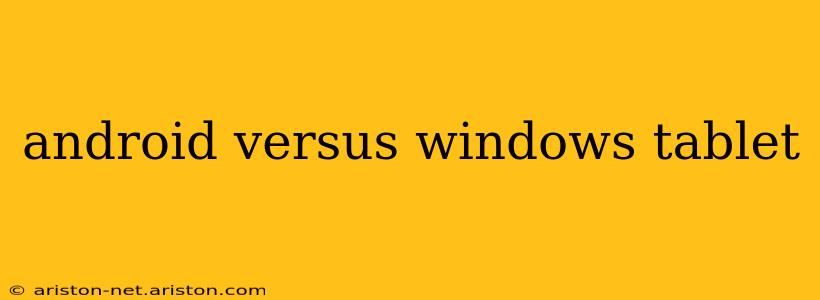Choosing between an Android and a Windows tablet can feel like navigating a maze. Both offer compelling features, but cater to different needs and preferences. This in-depth comparison will help you decide which operating system best suits your lifestyle and workflow. We'll delve into the key differences, exploring performance, app ecosystems, price points, and more, ultimately empowering you to make an informed decision.
What are the key differences between Android and Windows tablets?
The core difference lies in the operating systems themselves. Android, developed by Google, is known for its open-source nature, vast app selection (via the Google Play Store), and generally lower price points. Windows, Microsoft's operating system, offers greater compatibility with desktop software, stronger productivity features, and a more familiar interface for users already accustomed to Windows PCs. This translates to different strengths in various use cases.
Which tablet OS is better for gaming?
While both platforms offer a variety of games, Android generally edges out Windows in mobile gaming. The sheer volume of games available on the Google Play Store, coupled with the optimization for touchscreens in many titles, gives Android a significant advantage. However, high-end Windows tablets, particularly those with dedicated graphics processors, can handle more demanding PC games via emulation or streaming services like Xbox Cloud Gaming, making it a strong contender for specific titles.
Which tablet OS has better productivity features?
This is where Windows shines. Its compatibility with desktop applications like Microsoft Office, Adobe Creative Suite (with appropriate hardware), and various professional software packages makes it ideal for serious productivity tasks. While Android has improved its productivity capabilities with apps like Google Workspace, it still lags behind Windows in terms of feature richness and seamless integration with desktop software. This is especially important for users who need to work on complex projects or use specific industry-standard programs.
What is the difference in price between Android and Windows tablets?
Generally, Android tablets occupy the lower to mid-range price spectrum, offering a wide range of choices at various budget points. Windows tablets tend to be more expensive, particularly those with higher specifications capable of handling demanding tasks. This is largely due to the licensing costs associated with Windows and the more powerful hardware typically found in Windows tablets aimed at productivity users. However, affordable Windows tablets are becoming increasingly available.
Which tablet OS has a better app ecosystem?
This depends on your definition of "better." Android boasts a significantly larger number of apps available through the Google Play Store, catering to a broader range of needs and interests. However, Windows' strength lies in its compatibility with desktop applications, expanding its software library exponentially. So, while Android might have more apps specifically designed for tablets, Windows offers access to a much larger library encompassing mobile and desktop programs.
Which is better for media consumption?
Both platforms are perfectly capable of handling media consumption. Android often has a cleaner, simpler interface for basic media playback. However, Windows offers greater flexibility, particularly with its extensive support for various file formats and its potential for enhanced audio and video editing capabilities using desktop software. The choice here depends largely on your personal preferences regarding interface and desired editing features.
Which tablet OS is better for students?
The optimal OS for students depends heavily on their academic needs. Android tablets offer affordability and access to a wide range of educational apps. However, Windows tablets are advantageous for students needing to handle complex tasks, utilize specialized software, and seamlessly integrate their tablet with other devices in a larger ecosystem. Consider the specific software requirements of their courses when making a decision.
Android vs. Windows tablets: which is better for artists?
For artists, the choice is more nuanced. Android tablets offer a good selection of drawing apps and are often more affordable. However, Windows tablets, paired with a stylus and compatible software like Adobe Photoshop or Illustrator, generally offer greater precision and a wider array of artistic tools, making them the preferred choice for professional or serious digital artists.
In conclusion, the "best" operating system depends entirely on your individual needs and priorities. Android tablets excel in affordability, gaming, and a massive app selection, while Windows tablets dominate in productivity, compatibility with desktop software, and high-end capabilities. Carefully consider your usage scenarios and choose the OS that best aligns with your goals.
